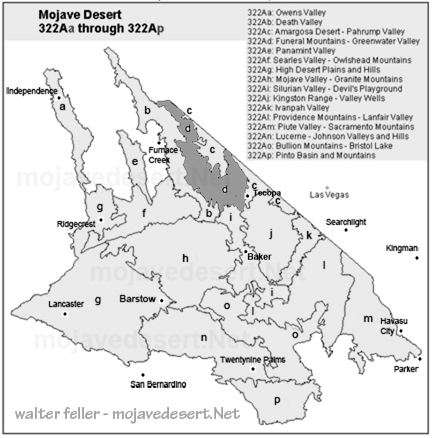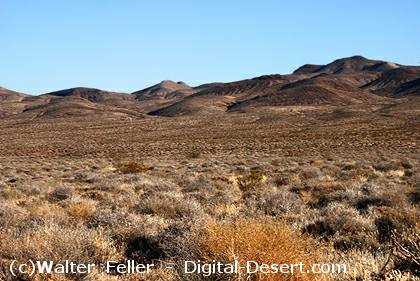Subsection 322Ad
Funeral Mountains - Greenwater Valley
This subsection includes the Funeral Mountains, Black Mountains, Greenwater Range, Resting Spring Range, and Nopah Range between Death Valley and the Amargosa Desert and Pahrump Valley. It includes a part of the Amargosa River valley and all of Greenwater and Chicago Valleys. The climate is hot to very hot and arid. MLRA 30g.
Lithology and Stratigraphy. This subsection contains a variety of geologic formations that can be arranged into six groups for ecological purposes: (1) a group of old rocks that are Paleozoic marine sedimentary and Precambrian sedimentary and metamorphic rocks; (2) plutonic rocks, that are Mesozoic mafic and Tertiary granitic rocks; (3) Tertiary volcanic rocks that are Oligocene, Miocene, and Pliocene basaltic, rhyolitic, and pyroclastic rocks; (4) Pliocene and Quaternary nonmarine sediments, mostly alluvial fan deposits; (5) late Quaternary alluvial fan and basin-fill deposits; and (6) late Quaternary lacustrine deposits.
Geomorphology. This subsection consists of steep to very steep mountains and valleys with very gently to moderately sloping alluvial fans and nearly level basin floor and dry lake bed. The mountains are aligned north-south, or toward the north-northwest. The elevation range is from about 1000 feet up to 6703 feet on Pyramid Peak in the Funeral Mountains. There are many peaks higher than 5000 feet above sea-level. Mass wasting, fluvial erosion and deposition, and eolian deflation and deposition are the main geomorphic processes.
Soils. The soils are mostly Lithic Torriorthents and Lithic Camborthids on old sedimentary and metamorphic rocks; Lithic Torriorthents on plutonic rocks; Lithic Torriorthents and Lithic Haplargids on Tertiary volcanic rocks; Typic subgroups of Torripsamments, Torriorthents, Calciorthids, and Haplargids on Pliocene and Quaternary alluvial fans; and Typic Torripsamments and Typic Torriorthents on basin floor. The soils are well drained, except for poorly drained playas. The soil temperature regimes are mostly thermic, but hyperthermic on the basin floor along the Amargosa River. Soil moisture regimes are aridic.
Vegetation. The predominant natural plant communities are Creosote bush series on fans and lower mountain slopes and Shadscale series on higher mountain slopes. Black bush series occurs on high mountain slopes. Mixed saltbush series is common on basin floor, and Iodine bush series and Saltgrass series are present on wet basin-fill and lacustrine deposits. Greasewood series occurs in riparian areas and around saltmarsh.
- Characteristic series by lifeform include:
Grasslands: Alkali sacaton series, Desert sand - verbena series, Indian ricegrass series, Pickleweed series, Saltgrass series.
Shrublands: Black bush series, Brittlebrush series, Creosote bush series, Creosote bush - white bursage series, Desert-holly series, Fourwing saltbrush series, Greasewood series, Hop-sage series, Iodine bush series, Mixed saltbush series, Scadscale series, White bursage series.
Forests and woodlands: Mesquite series.
Surface Water. Runoff is rapid from mountains and alluvial fans and slow from basin-fill. Most runoff drains to Death Valley, either directly from the west-southwest sides of the Funeral Mountains and Black Mountains or through the Amargosa Desert, Greenwater Valley, or Chicago Valley to the Amargosa River which drains into Death Valley. The Amargosa River, which is the largest stream draining into Death Valley, is dry most of each year; but it does have several large springs along its channel. There is temporary ponding on playas, or dry lake beds.
< previous - Mojave Desert - next >
clickable map - select a section to view

Greenwater Valley